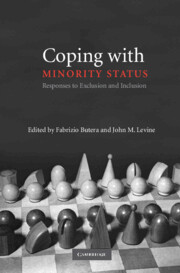Book contents
- Frontmatter
- Contents
- Contributors
- Introduction
- PART I COPING WITH EXCLUSION: BEING EXCLUDED FOR WHO YOU ARE
- PART 2 COPING WITH EXCLUSION: BEING EXCLUDED FOR WHAT YOU THINK AND DO
- PART 3 COPING WITH INCLUSION
- 12 Multiple identities and the paradox of social inclusion
- 13 Prominority policies and cultural change: A dilemma for minorities
- 14 Influence without credit: How successful minorities respond to social cryptomnesia
- 15 Influence and its aftermath: Motives for agreement among minorities and majorities
- Index
- References
12 - Multiple identities and the paradox of social inclusion
Published online by Cambridge University Press: 05 June 2012
- Frontmatter
- Contents
- Contributors
- Introduction
- PART I COPING WITH EXCLUSION: BEING EXCLUDED FOR WHO YOU ARE
- PART 2 COPING WITH EXCLUSION: BEING EXCLUDED FOR WHAT YOU THINK AND DO
- PART 3 COPING WITH INCLUSION
- 12 Multiple identities and the paradox of social inclusion
- 13 Prominority policies and cultural change: A dilemma for minorities
- 14 Influence without credit: How successful minorities respond to social cryptomnesia
- 15 Influence and its aftermath: Motives for agreement among minorities and majorities
- Index
- References
Summary
INTRODUCTION
Modern societies, and organizations within these societies, are characterized by increasing diversity and the coexistence of multiple groups. How to successfully manage this diversity has been the focus of much political debate and scientific research. One of the core goals of diversity-management strategies is to avoid schisms and conflict between groups. This will enable the achievement of a socially cohesive society in which members of all groups are included. Two opposing strategies to achieve social inclusion are commonly proposed: assimilation and multiculturalism (or pluralism; see Fredrickson, 1999 for an overview). Proponents of assimilation strategies argue that social cohesion can only be achieved when subgroup identities are relinquished (e.g., Barry, 2001; Schlesinger, 1992). However, in line with the multiculturalism ideology, we propose that the maintenance of subgroup identities is essential for the development of healthy identities and positive relationships with other groups (e.g., Berry, 2001; Lambert & Taylor, 1990). In this chapter, we provide an analysis of the consequences of assimilationist pressures for the individual, for the group, and for society at large. We review social psychological evidence bearing on this issue and conclude that far from promoting social inclusion, assimilationist pressures have the paradoxical effect of actually contributing to the social exclusion of minority group members.
Information
- Type
- Chapter
- Information
- Coping with Minority StatusResponses to Exclusion and Inclusion, pp. 269 - 292Publisher: Cambridge University PressPrint publication year: 2009
References
Accessibility standard: Unknown
- 16
- Cited by
